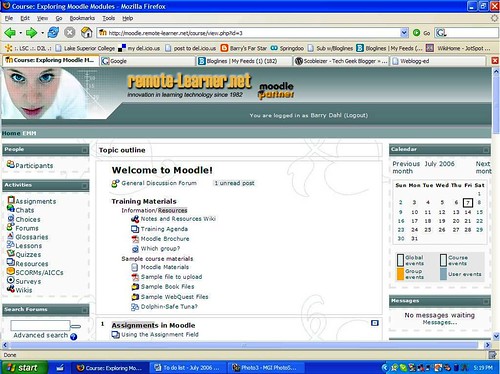Moodle NECC2006
 Moodle Hands-on Lab (2:30-3:30)
Moodle Hands-on Lab (2:30-3:30)Michelle Moore was the presenter and did a great job.
She works for Remote-Learner dot net and appears to be a Moodle evangelist.
Remote-learner.net provides training and hosting for Moodle, among other things.
Moodle is based on social constructionist pedagogy.
FOSS (free and open source software): large community of developers and Moodle can be modified for your purposes.
Over 13,000 sites using Moodle in 158 countries (plus plenty of unregistered users).
Used in 73 languages (via language packs).
You can create your own free demo account at: http://moodle.remote-learner.net
 Homepage is similar to D2L with things that are similar to D2L widgets, but appears to be a little easier to customize. The html editor works well with Firefox but occasionally has problems with IE on a Mac and a few other possible variations of OS and browser.
Homepage is similar to D2L with things that are similar to D2L widgets, but appears to be a little easier to customize. The html editor works well with Firefox but occasionally has problems with IE on a Mac and a few other possible variations of OS and browser.Forum Module (called Discussions in D2L)
- Provides area for group discussions
- Can be restricted in various ways, such as (a) Only teacher can post, (b) Student can post only once, (c) Postings may only be allowed in a specific time frame, etc.
- Posts can be rated by teacher and/or students (either quantitatively or qualitatively)
Your post was successfully added.
You have 30 mins to edit it if you want to make any changes.
( Continue )
Quiz tool is very similar to D2l in functionality and question types. (quiz screenshot)
Something unique: Choice Module (screenshot)
- Basically an informal survey tool
- Create questions and provide choices for participants
- Display the results anonymously or with names and faces
- Results can be exported into Excel
- Similar to a polling tool....i.e....who thinks this a good idea?...what kind of pizza should we order for the party?....how many of you are visit Wikipedia regularly?...etc.
- Assignments: Teachers can use the "Assignment" area to give students tasks. The types of assignments are: offline, online text, and online file upload. Students can use Moodle to turn in assignments electronically. When teachers create online assignments they have the option to allow students to submit an assignment more than once. Furthermore teachers can set due dates, give grades, and feedback in this area of Moodle.
- Lessons: Lessons provide teachers with the ability to present content and assess learning all in one activity. In a standard lesson, a teacher can create a set of linked "pages" with each page presenting content and a question. A student's progress through the lesson is based on how he answers these questions. For example, for a correct answer a learner may go to the next page. With an incorrect answer the learner may find himself back at the same page or at a new review page. In more complex lessons, teachers can create a lesson with several distinct branches. The lesson module may also be used to create electronic flash cards.
- Resources: The Resource module is the primary tool for bringing content into a course. Resources may be as simple as plain text typed directly into Moodle or as complicated as a program that makes use of "external web applications." Teachers can also upload files, provide links to the web, or create resources using HTML with the Resource tool. Types of content include:
- Text files
- HTML files
- Links to webpages
- Video and audio clips
- A directory feature is available for the resources.
Technorati Tags: NECC2006, NECC06, NECC, Moodle


Comments